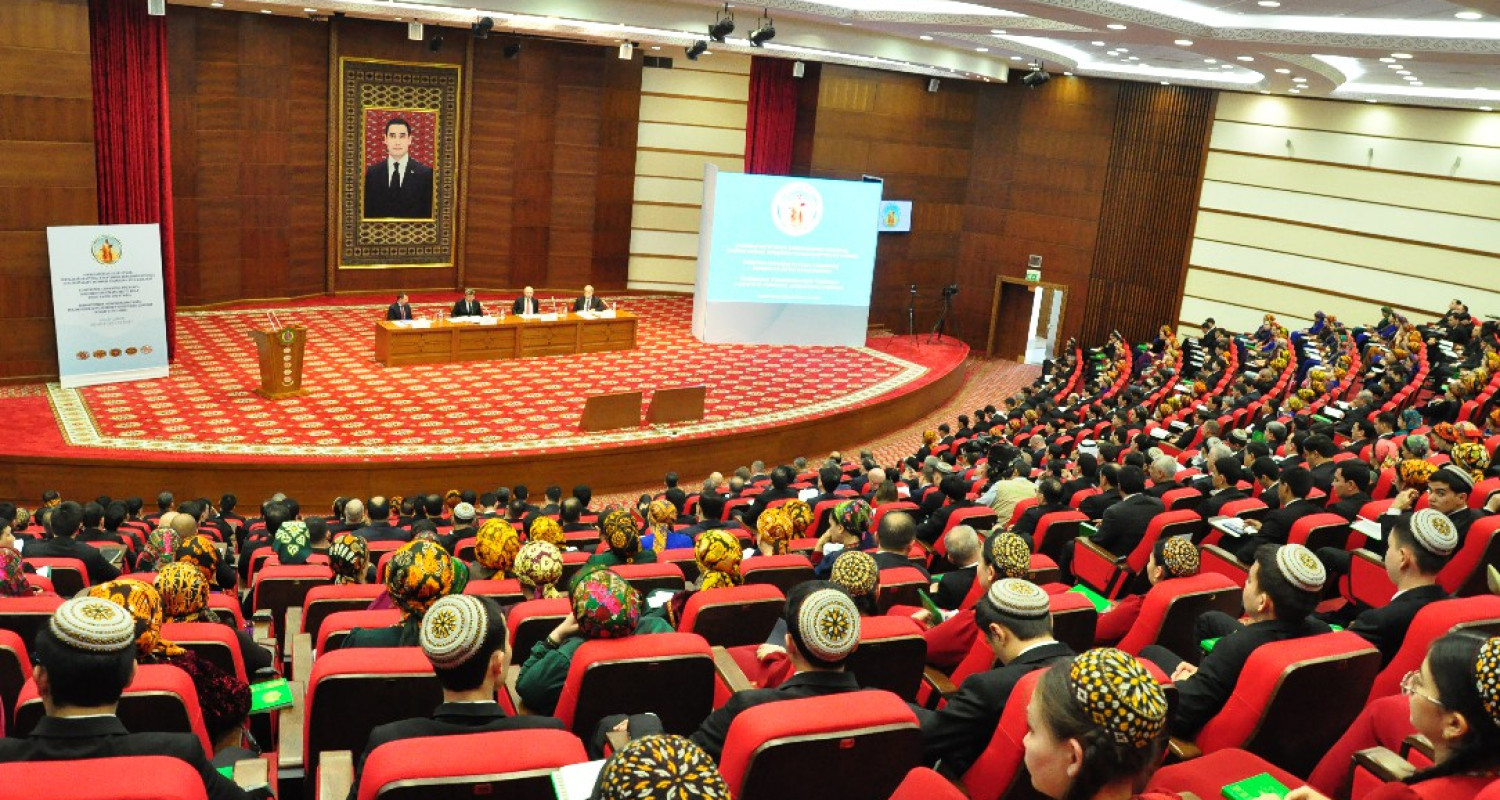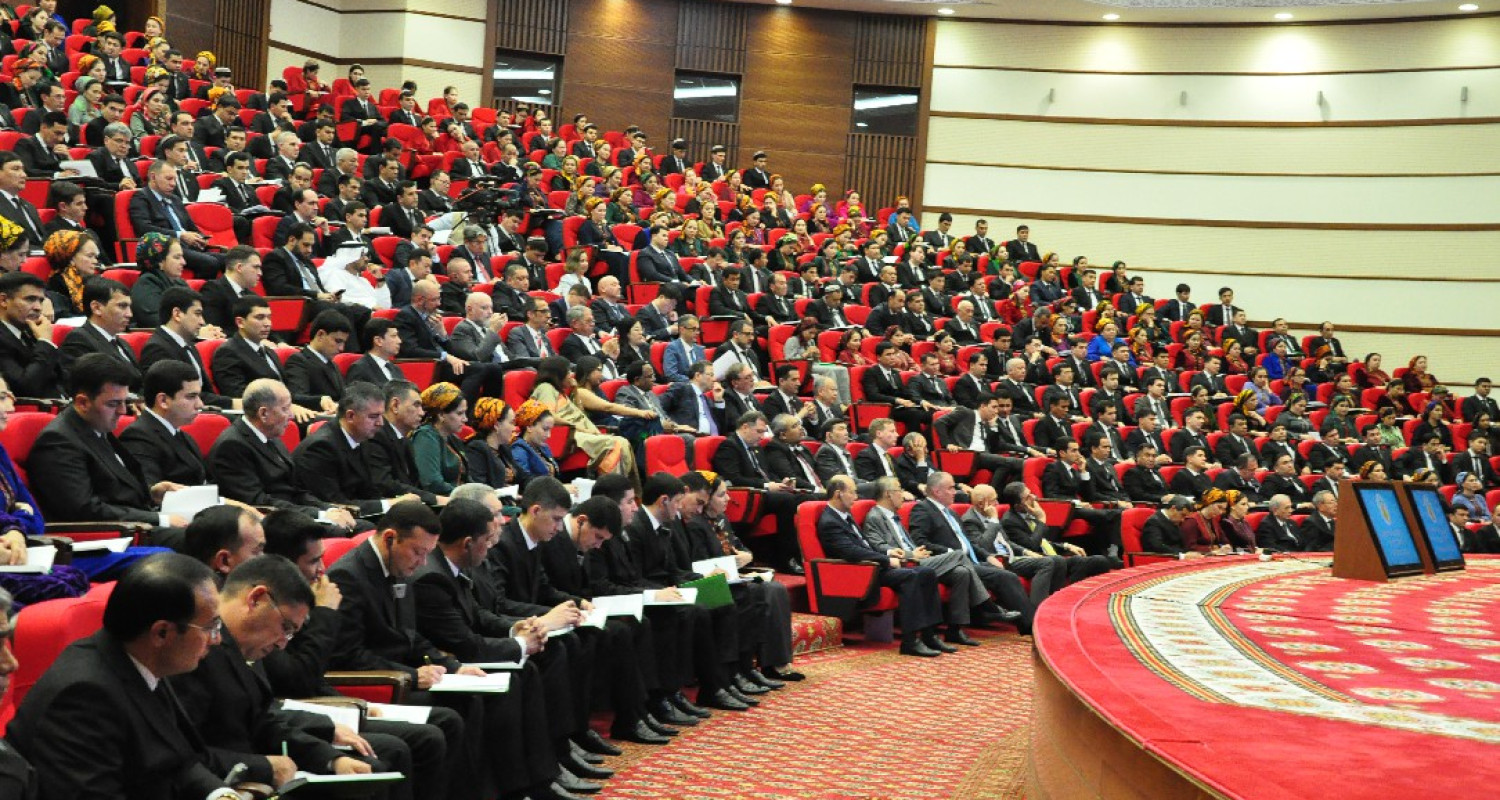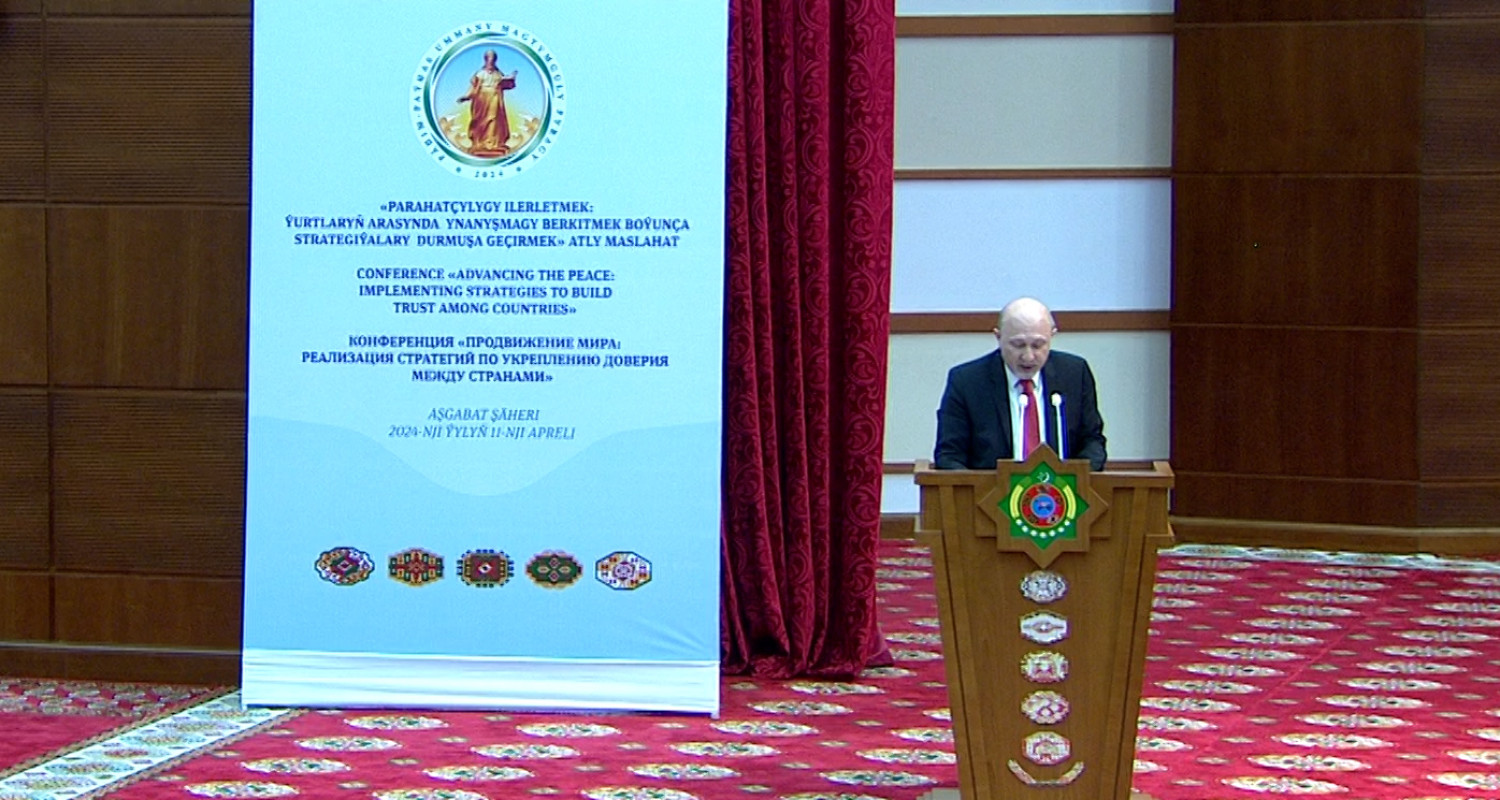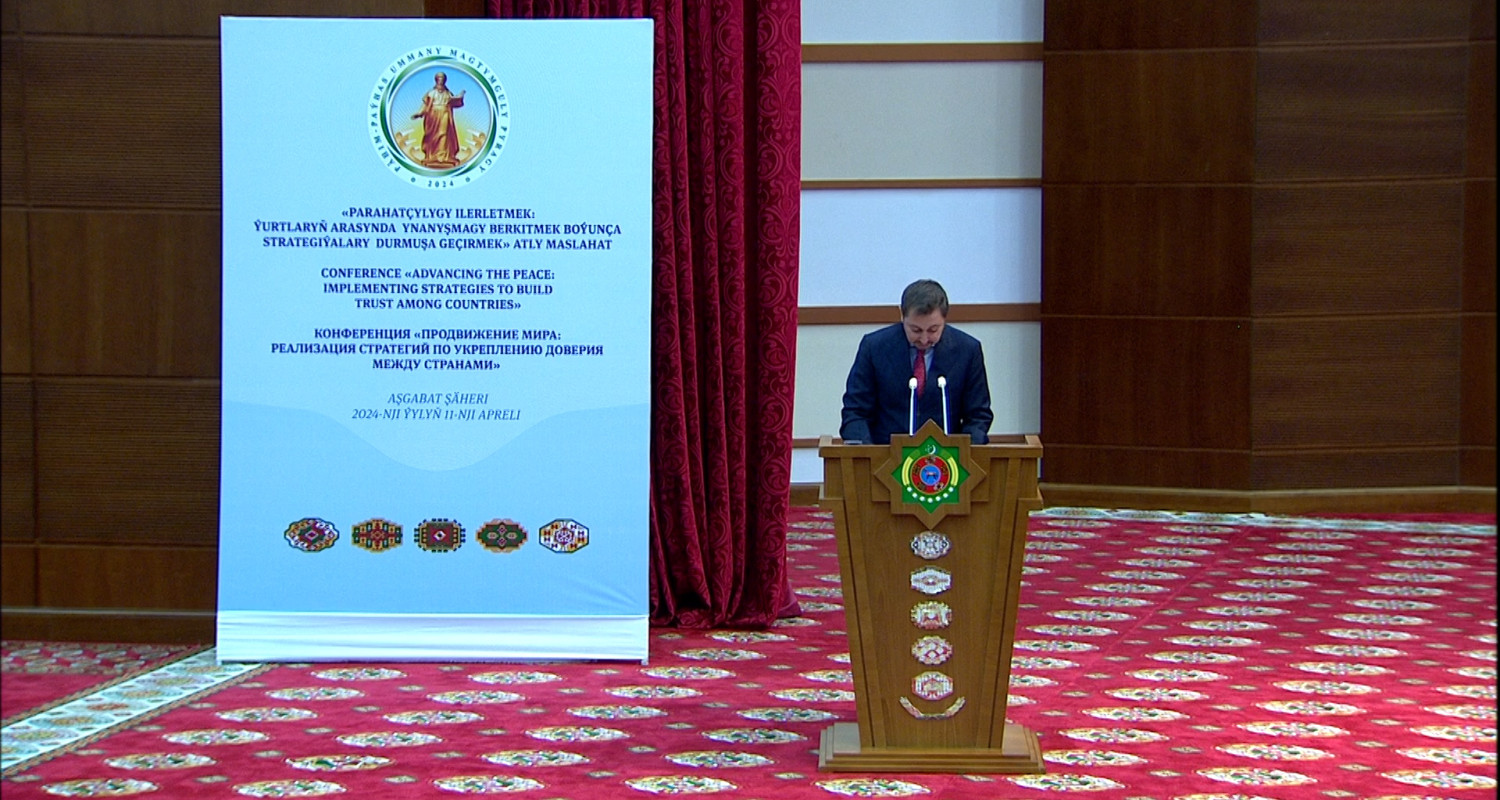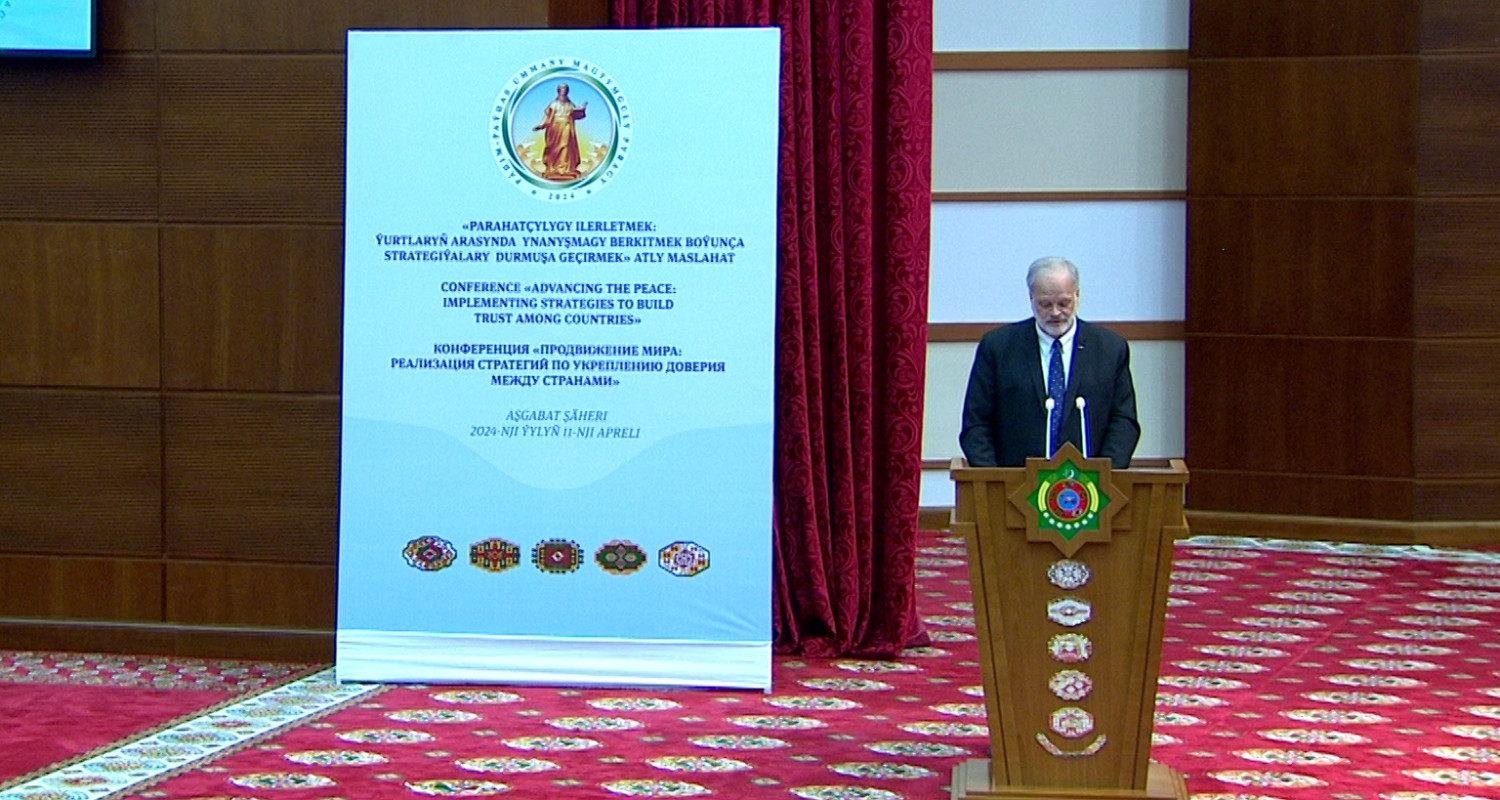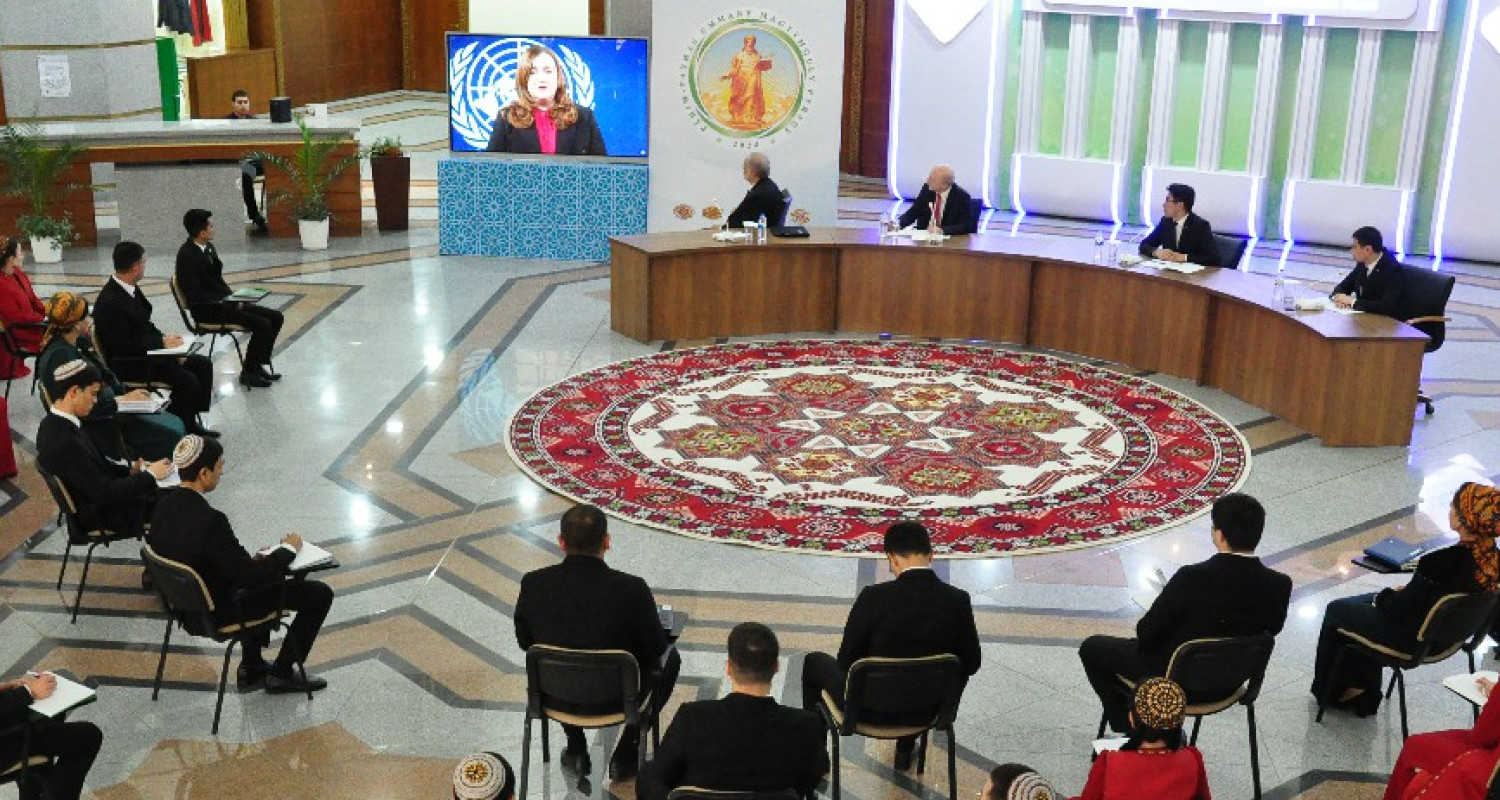nCa Report
Turkmenistan hosted an international conference on 11 April 2024. The theme of the conference was – Promoting Peace: implementing strategies to strengthen trust between countries.
The event was held in hybrid format, with participants and speakers in the auditorium of the institute of international relations in Ashgabat while some speakers joined through video links.
The deputy prime minister and foreign minister of Turkmenistan, Rashid Meredov delivered the keynote address, underlining some important aspects of the foreign policy of Turkmenistan.
The participants at the conference hall included the Special Representative of the Secretary General, Head of the UN Regional Center for Preventive Diplomacy for CA K.Imnadze, UN Resident Coordinator in Turkmenistan D.Shlapachenko, Head of the Organization for Security and Cooperation in Europe (OSCE) in Ashgabat D.McGregor, representatives of the diplomatic corps accredited in Turkmenistan, the faculty of the institute, as well as students.
The Deputy Director General of the World Trade Organization S.Zhang, Assistant Secretary General, Assistant Administrator and Director of the Regional Bureau for Europe and the Commonwealth of Independent States of the UN Development Program I.Zivkovic, Deputy Director General and Regional Representative of the Food and Agriculture Organization of the United Nations for Europe and CA V.Gutsu, Regional Director of the UN Development Coordination Office for Europe and CA G.Son, Deputy Executive Director of the International Trade Center D. Tembo and UNICEF Regional Director for Europe and Central Asia R. De Dominicis spoke via digital video link.
The conference participants noted in their speeches that, at the 63rd plenary meeting of the 78th session, the UN General Assembly, at the initiative of Turkmenistan, on March 21, 2024, adopted resolution 78/266 by consensus on declaring “2025 the International Year of Peace and Trust”, which demonstrates the importance of continuing activities to promote a culture of peaceful dialogue in the international community.
This was the next step in the consistent efforts of the President of Turkmenistan to promote a culture of peaceful and trusting dialogue in the international community. Like previous decisions of the UN General Assembly to declare “2021 the International Year of Peace and Trust” and 2023 the “Year of Dialogue as a Guarantee of Peace,” a new initiative is based on the principles of the UN Charter and generally accepted norms of international law, taking into account current realities and trends in global development.
During the event, it was also stated that the adoption of the UN General Assembly Resolution “2025 – International Year of Peace and Trust” as a platform for joint action is intended to contribute to the resolution of emerging conflict situations by peaceful, political and diplomatic methods and means, strengthening trusting relations between states.
The conference “Promoting Peace: implementing strategies to strengthen trust between countries” continued under thematic sessions such as “Political, humanitarian and diplomatic mechanisms for resolving conflicts and building confidence”, “The role of international organizations in supporting and facilitating peace processes” and “Economic aspects of support sustainable development and peace.”
* * *
The moderator was Deputy Chairman of the Cabinet of Ministers, Minister of Foreign Affairs of Turkmenistan Rashid Meredov. He introduced the speakers and commented on their statements, summarizing the opinions and views expressed. In fact, the conference has already launched the program of the International Year of Peace and Trust, announced by the UN for 2025 at the initiative of Turkmenistan, becoming the first introductory event in this direction.
The process of substantive, meaningful communication to promote peace and trust between countries today is among the most pressing priorities on the world agenda. Turkmenistan is convinced that strengthening trust is the most valuable capital, an investment in the constructive direction of international relations for decades to come, minimizing and preventing conflict-generating risks and threats.
In this aspect, Rashid Meredov noted the role of diplomacy. It is objectively getting stronger. Conviction of this was dictated by Turkmenistan’s initiative at the UN to declare 2025 the International Year of Peace and Trust.
The head of the Ministry of Foreign Affairs of Turkmenistan paid special attention to relations between the countries of Central Asia. This is where neutrality and preventive diplomacy can play a key role. According to Rashid Meredov, our common task – both the Central Asian countries themselves and extra-regional partners, states and international organizations – is to identify and formulate models of cooperation based on the mentioned historical experience, traditions, mentality and worldview imperatives.
“Under no circumstances should alien values and meanings be implanted here, rejected by nature itself and the entire way of life of people. This, as practice shows, is doomed to failure,” Meredov emphasized.
Turkmenistan is convinced that it is necessary to establish and maintain dialogue with Afghanistan. The criteria should be mutual respect and equality. A clear and clear strategy is needed to assist in economic recovery and solve the humanitarian problems of this country, said Deputy Prime Minister and Minister of Foreign Affairs of Turkmenistan Rashid Meredov.
Turkmenistan has been implementing its approaches for many years, providing economic support to Afghanistan, implementing major infrastructure projects with its participation, building social facilities, and sending humanitarian convoys on a regular basis.
As for the political settlement in Afghanistan, today there are several international platforms and formats that Turkmenistan, in general, supports.
“But we are also convinced that on the Afghan track, a special mission objectively belongs to the neighboring countries of Afghanistan, taking into account their geographic proximity to Afghanistan, historical ties and cultural proximity,” Meredov said. – We believe that neighboring states need a unified, inclusive approach to the Afghan issue, based on a strategic vision. Achieving sustainable peace, stability, and dynamic development in Afghanistan today should become a priority goal of the international community in the region.”
Deputy Secretary General, Executive Secretary of the UN Economic Commission for Europe Tatyana Molchan, on behalf of the Community of Nations, highly appreciated Turkmenistan’s commitment to peace and sustainable development in cooperation with the UN.
“Peace and development are closely linked to trust. Conflicts around the world and in regions affect millions of lives and homes and damage sustainable development. It also threatens the complex connectivity of the Central Asian region, affecting trade and transport routes,” she said.
The recent UNECE Regional Forum on Sustainable Development highlighted the critical nexus of cooperation between governments, UN agencies and all stakeholders involved for proactive action.
“During such conflicts, we need platforms like this more than ever to discuss pressing issues and concrete proposals to advance the SDGs. Joint efforts for cooperation and interconnectedness can be a driving force for peaceful and sustainable development,” says Molchan.
Next, Deputy Director General of the World Trade Organization Xiangchen Zhang spoke online.
Assistant Secretary General, Assistant Administrator and Director of the Regional Bureau for Europe and the CIS of the United Nations Development Program Ivana Zivkovic addressed the audience in Ashgabat via video.
Special Representative of the Secretary General, Head of the UN Regional Center for Preventive Diplomacy for Central Asia Kakha Imnadze emphasized the urgent need to develop and strengthen preventive diplomacy based on multilateralism and inclusive political dialogue that promotes peace and security, development and respect for human rights.
The video message was delivered by Viorel Gutu, Deputy Director General and Regional Representative of the Food and Agriculture Organization of the United Nations (FAO) for Europe and Central Asia, and Gwi-Yeop Son, Regional Director of the UN Development Coordination Office for Europe and Central Asia.
Ms. Song thanked the government of Turkmenistan for constantly promoting the importance of maintaining peace and building trust in the global community under the auspices of the UN. The need for these fundamental values has never been more urgent or urgent. The international situation is full of tension, wars and conflicts, and their causes have become more complex and difficult to resolve. This is a key factor in the forced displacement of more than 108 million people around the world, she said.
“While the promise of peace remains elusive for many, hopes for a better world will continue to prevail. It is in this context that the International Year of Peace and Trust, initiated by Turkmenistan, acquires great importance,” noted the director of the UN Development Coordination Bureau for Europe and Central Asia.
Coming to the podium, UN Resident Coordinator in Turkmenistan Dmitry Shlapachenko, on behalf of the United Nations, congratulated the government of Turkmenistan on the adoption of this important resolution, which calls on states to build bridges of trust for the sake of global peace.
“Rising tensions between different states and fierce competition between regional groups are a clear sign of a crisis of trust in interstate relations,” he said. – The UN has a critical role to play in stimulating a global culture of peace and should serve as a global platform for finding solutions and improving dialogue. It is in this context that the Government of Turkmenistan’s consistent approach to promoting peace through dialogue and trust has received widespread recognition at the global level.”
Head of the OSCE Center in Ashgabat John McGregor, continuing the topic, touched upon the “reason for existence” of the Organization for Security and Co-operation in Europe and its founding document – the Helsinki Final Act, the signing of which marked the creation of an unprecedented mechanism for building trust and overcoming differences between participating states with different programs .
In his opinion, it is symbolic that the OSCE will celebrate its 50th anniversary in 2025, declared by a resolution of the UN General Assembly as the International Year of Peace and Trust at the initiative of neutral Turkmenistan.
Summing up the speech, MacGregor said: “In striving for trust and working to promote peace, it can be said that Turkmenistan and the OSCE are jointly continuing the legacy of Magtymguly Fragi, whose 300th anniversary we celebrate this year. A review of his works shows how far-sighted he was. We know that Magtymguly contributed to humanity, peace, better understanding and harmony between neighboring states. Obviously, this is what the OSCE is trying to do, and this is what Turkmenistan is trying to do.”
After the plenary session, the conference continued in three thematic sessions: “Political, humanitarian and diplomatic mechanisms for resolving conflicts and building confidence”, “The role of international organizations in supporting and facilitating peace processes” and “Economic aspects of supporting sustainable development and peace”. /// nCa, 12 April 2024 [this is composite report, combining material from MFA Turkmenistan, TDH, and Orient]
